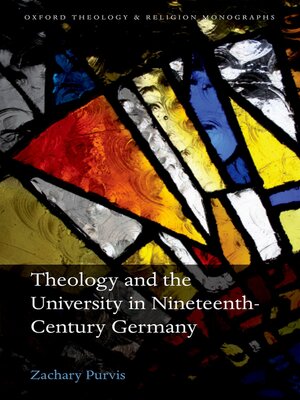Theology and the University in Nineteenth-Century Germany
ebook ∣ Oxford Theology and Religion Monographs
By Zachary Purvis

Sign up to save your library
With an OverDrive account, you can save your favorite libraries for at-a-glance information about availability. Find out more about OverDrive accounts.
Find this title in Libby, the library reading app by OverDrive.



Search for a digital library with this title
Title found at these libraries:
| Library Name | Distance |
|---|---|
| Loading... |
Theology and the University in Nineteenth-Century Germany examines the dual transformation of institutions and ideas that led to the emergence of theology as science, the paradigmatic project of modern theology associated with Friedrich Schleiermacher. Beginning with earlier educational reforms across central Europe and especially following the upheavals of the Napoleonic period, an impressive list of provocateurs, iconoclasts, and guardians of the old faith all confronted the nature of the university, the organization of knowledge, and the unity of theology's various parts, quandaries which together bore the collective name of 'theological encyclopedia'. Schleiermacher's remarkably influential programme pioneered the structure and content of the theological curriculum and laid the groundwork for theology's historicization. Zachary Purvis offers a comprehensive investigation of Schleiermacher's programme through the era's two predominant schools: speculative theology and mediating theology. Purvis highlights that the endeavour ultimately collapsed in the context of Wilhelmine Germany and the Weimar Republic, beset by the rise of religious studies, radical disciplinary specialization, a crisis of historicism, and the attacks of dialectical theology. In short, the project represented university theology par excellence. Engaging in detail with these developments, Purvis weaves the story of modern university theology into the broader tapestry of German and European intellectual culture, with periodic comparisons to other national contexts. In doing so, he Purvis presents a substantially new way to understand the relationship between theology and the university, both in nineteenth-century Germany and, indeed, beyond.







